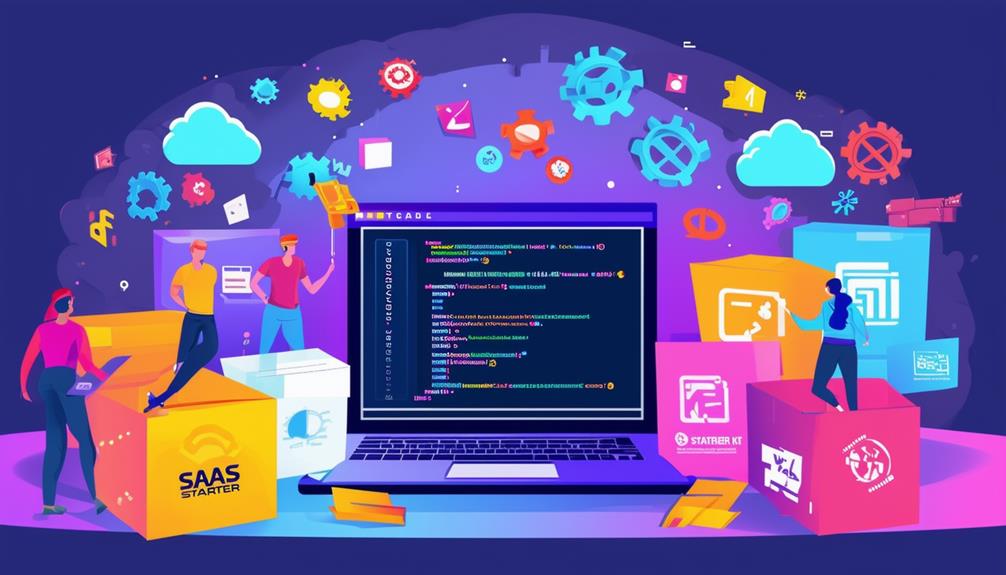You’re about to initiate a journey through the backbone of modern SaaS applications. These five essential technologies power the starter kits that are revolutionizing how businesses launch their software products. From robust backend frameworks to sleek frontend libraries, each component plays a vital role in creating scalable, efficient, and user-friendly applications. As you explore these technologies, you’ll gain insights into why they’re indispensable for SaaS development and how they work together to create a seamless user experience. But that’s just the tip of the iceberg – there’s much more to uncover about how these tools can accelerate your SaaS project from concept to launch.
Backend Frameworks
At the heart of any robust SaaS starter kit, you’ll find powerful backend frameworks that serve as the foundation for building scalable and efficient web applications. These frameworks provide the essential structure and tools you need to develop your SaaS product quickly and effectively.
Popular backend frameworks like Django (Python), Ruby on Rails, and Node.js with Express have become go-to choices for many SaaS developers. Django, for instance, offers a ‘batteries included’ approach with built-in admin panels and ORM, making it ideal for rapid development. Rails, known for its convention over configuration principle, can greatly speed up your development process.
When selecting a backend framework, consider factors such as your team’s expertise, scalability requirements, and the specific needs of your SaaS product. Look for frameworks that offer robust security features, efficient database management, and API development capabilities.
According to recent surveys, Node.js is gaining traction in the SaaS world due to its performance and scalability. It’s used by 49.9% of professional developers, showcasing its popularity in the industry.
Frontend Libraries and Frameworks
Complementing robust backend frameworks, frontend libraries and frameworks are essential components in SaaS starter kits, enabling developers to create responsive, interactive, and user-friendly interfaces. Popular choices include React, Vue.js, and Angular, each offering unique advantages for building modern web applications.
React, developed by Facebook, boasts a large ecosystem and a component-based architecture. It’s known for its virtual DOM, which optimizes rendering performance.
Vue.js, on the other hand, is praised for its gentle learning curve and flexibility, making it an excellent choice for both small and large-scale projects.
Angular, backed by Google, provides a complete framework with built-in tools for routing, form validation, and state management.
When selecting a frontend library or framework for your SaaS starter kit, consider factors like community support, performance, and scalability. React’s extensive third-party library ecosystem can accelerate development, while Vue.js’s simplicity may lead to faster onboarding for new team members. Angular’s opinionated structure can enforce consistency in large projects.
Many SaaS starter kits also incorporate UI component libraries like Material-UI or Tailwind CSS, which provide pre-built, customizable elements to streamline the design process and guarantee a polished user interface.
Database Management Systems
Nearly every SaaS starter kit relies on a robust database management system (DBMS) to store, retrieve, and manage data efficiently. You’ll find that popular choices include relational databases like PostgreSQL and MySQL, as well as NoSQL options such as MongoDB and Redis. Each has its strengths, catering to different data structures and scalability needs.
When selecting a DBMS for your SaaS, consider factors like data complexity, expected growth, and query performance. PostgreSQL excels in handling complex queries and supporting JSON data, making it ideal for feature-rich applications. MongoDB’s document-based structure offers flexibility for evolving schemas, perfect for startups with changing requirements.
Don’t overlook the importance of database optimization techniques. Indexing, query caching, and proper data modeling can greatly boost your app’s performance. Many SaaS starter kits come with pre-configured ORM (Object-Relational Mapping) tools, simplifying database interactions and reducing development time.
Cloud-based database services like Amazon RDS or Google Cloud SQL are gaining traction, offering scalability and managed maintenance. They’re worth considering if you’re looking to minimize infrastructure management overhead while ensuring high availability for your SaaS product.
Authentication and Authorization Services
Most SaaS starter kits incorporate robust authentication and authorization services to guarantee secure user access and data protection. These services are essential for safeguarding your application and user data from unauthorized access and potential breaches.
Authentication services verify user identities, typically through username/password combinations or multi-factor authentication (MFA). Popular options include OAuth 2.0, JSON Web Tokens (JWT), and OpenID Connect. These protocols guarantee secure login processes and session management.
Authorization services, on the other hand, determine what actions authenticated users can perform within your application. Role-based access control (RBAC) is a common implementation, allowing you to assign specific permissions to different user roles.
Many SaaS starter kits integrate third-party authentication providers like Auth0, Okta, or Firebase Authentication. These services offer pre-built components and APIs that simplify the implementation of secure authentication and authorization systems.
When selecting a starter kit, look for those that support industry-standard protocols and offer flexibility in integrating various authentication methods. This approach guarantees your SaaS application can scale securely and adapt to evolving security requirements.
API Development Tools
SaaS starter kits often include powerful API development tools that’ll streamline your backend infrastructure and enable seamless data exchange between your application’s components. These tools are essential for building robust, scalable APIs that form the backbone of your SaaS product.
You’ll typically find frameworks like Express.js for Node.js or Django for Python, which offer pre-built modules for routing, middleware, and request handling. These frameworks can slash your development time by up to 40%, according to industry benchmarks.
API documentation tools like Swagger or OpenAPI are often bundled in, allowing you to create interactive, always-up-to-date API references. This can reduce support tickets by 30% and improve developer onboarding times.
For testing and debugging, you might get tools like Postman or Insomnia, which help you validate API endpoints and simulate client requests. These can catch up to 80% of common API issues before they reach production.
Many kits also include API security features, such as rate limiting and JWT authentication, to protect your endpoints from abuse. With these tools, you can build, document, test, and secure your APIs efficiently, laying a solid foundation for your SaaS product.
To Wrap Up
You’ve now got the inside scoop on the key technologies powering SaaS starter kits.
From robust backends to slick frontends, these tools are your secret weapons for rapid development.
Don’t forget the importance of solid databases and secure authentication.
And with API tools at your fingertips, you’re all set to create seamless integrations.
Ready to plunge into? These technologies are your fast track to building scalable, user-friendly SaaS solutions.






